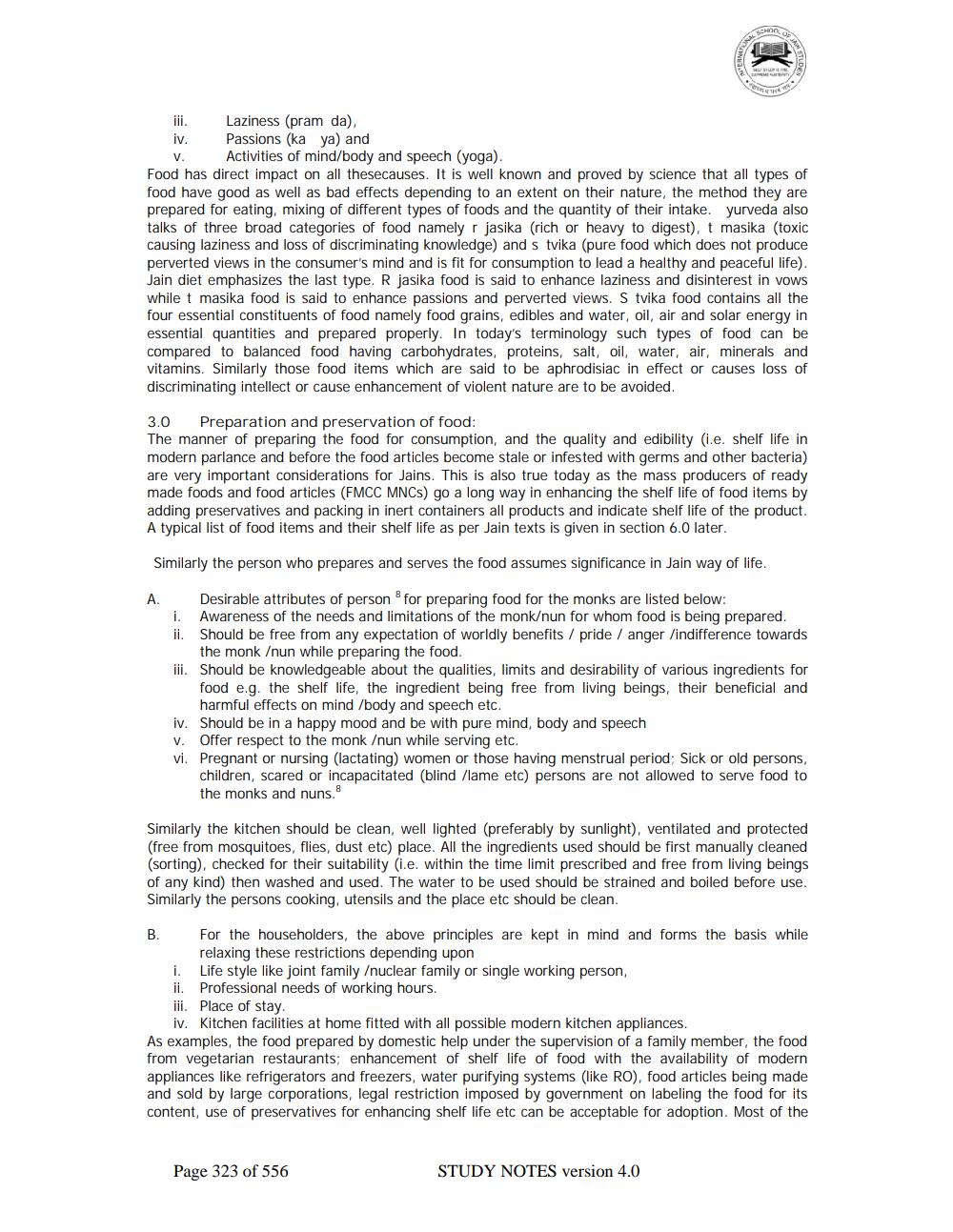________________
Laziness (pram da). iv. Passions (ka ya) and
v. Activities of mind/body and speech (yoga). Food has direct impact on all thesecauses. It is well known and proved by science that all types of food have good as well as bad effects depending to an extent on their nature, the method they are prepared for eating, mixing of different types of foods and the quantity of their intake. yurveda also talks of three broad categories of food namely r jasika (rich or heavy to digest), t masika (toxic causing laziness and loss of discriminating knowledge) and s tvika (pure food which does not produce perverted views in the consumer's mind and is fit for consumption to lead a healthy and peaceful life). Jain diet emphasizes the last type. R jasika food is said to enhance laziness and disinterest in vows while t masika food is said to enhance passions and perverted views. S tvika food contains all the four essential constituents of food namely food grains, edibles and water, oil, air and solar energy in essential quantities and prepared properly. In today's terminology such types of food can be compared to balanced food having carbohydrates, proteins, salt, oil, water, air, minerals and vitamins. Similarly those food items which are said to be aphrodisiac in effect or causes loss of discriminating intellect or cause enhancement of violent nature are to be avoided.
3.0 Preparation and preservation of food: The manner of preparing the food for consumption, and the quality and edibility (i.e. shelf life in modern parlance and before the food articles become stale or infested with germs and other bacteria) are very important considerations for Jains. This is also true today as the mass producers of ready made foods and food articles (FMCC MNCs) go a long way in enhancing the shelf life of food items by adding preservatives and packing in inert containers all products and indicate shelf life of the product. A typical list of food items and their shelf life as per Jain texts is given in section 6.0 later
Similarly the person who prepares and serves the food assumes significance in Jain way of life.
A.
Desirable attributes of person for preparing food for the monks are listed below: i. Awareness of the needs and limitations of the monk/nun for whom food is being prepared. ii. Should be free from any expectation of worldly benefits/ pride / anger /indifference towards
the monk /nun while preparing the food. iii. Should be knowledgeable about the qualities, limits and desirability of various ingredients for
food e.g. the shelf life, the ingredient being free from living beings, their beneficial and
harmful effects on mind /body and speech etc iv. Should be in a happy mood and be with pure mind, body and speech V. Offer respect to the monk /nun while serving etc. vi. Pregnant or nursing (lactating) women or those having menstrual period; Sick or old persons,
children, scared or incapacitated (blind /lame etc) persons are not allowed to serve food to the monks and nuns.
Similarly the kitchen should be clean, well lighted (preferably by sunlight), ventilated and protected (free from mosquitoes, flies, dust etc) place. All the ingredients used should be first manually cleaned (sorting), checked for their suitability (i.e. within the time limit prescribed and free from living beings of any kind) then washed and used. The water to be used should be strained and boiled before use. Similarly the persons cooking, utensils and the place etc should be clean.
For the householders, the above principles are kept in mind and forms the basis while
relaxing these restrictions depending upon i. Life style like joint family /nuclear family or single working person, ii. Professional needs of working hours. iii. Place of stay.
iv. Kitchen facilities at home fitted with all possible modern kitchen appliances. As examples, the food prepared by domestic help under the supervision of a family member, the food from vegetarian restaurants; enhancement of shelf life of food with the availability of modern appliances like refrigerators and freezers, water purifying systems (like RO), food articles being made and sold by large corporations, legal restriction imposed by government on labeling the food for its content, use of preservatives for enhancing shelf life etc can be acceptable for adoption. Most of the
Page 323 of 556
STUDY NOTES version 4.0




